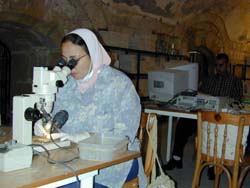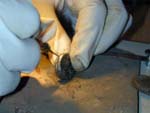SHALLALAT
Restoration of coins
Since the beginning of our excavations in Alexandria, in 1992, we have discovered more than 15000 coins. These are often badly corroded and must be restored in order to view the symbols with which they are marked. Until 1998, this work was done in the laboratory of the Egyptian antiquities service at Kom el Dikka. The restorers of this lab, while perfectly competent, were completely overwhelmed by the amount of work, in that they had to deal with all metal objects within the vast collections of the Graeco-Roman Museum as well as finds from the other foreign missions in Alexandria. Moreover, in 1998, only about one hundred coins from our excavations had been treated while some 2817 waited their turn to be restored. Since the discovery of coins in our digs continued daily, it was deemed necessary to react to a situation that could only get worse. Thus, in February 1999, I took the decision to establish our own laboratory to handle coins found, and yet to be found, in the CEA excavations.
Luck was with us in that we were able to engage Marina Biron, a restorer from Bordeaux, who freed herself from her many responsibilities to come to Alexandria in March of that year and set up the new laboratory. At the same time, Mme Hannah who worked in the Kom el Dikka lab accepted to join us. With the short term missions of Marina (up to two months per year), all we now needed was to find the necessary financing and equipment.

Hannah Tewfik

Thanks to a generous donation from the Swiss Association des Amis d'Alexandrie, the purchase of the initial equipment necessary to open the lab was possible. A first donation of 5000 SF allowed us to buy a binocular microscope and to search the market for a micro-lathe, an ultra-sound device, a set of high precision electronic scales, etc. It is hoped that other more expensive equipment (notably a micro-sander, 12000 SF approx.) will be acquired in the future. Perhaps we will find a sponsor among the companies that manufacture this type of tool?
JeanYves EMPEREUR